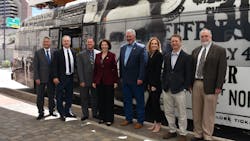RTC Washoe County achieves 100 percent alternative fuel transit fleet 13 years ahead of schedule
The Regional Transportation Commission (RTC) of Washoe County is now operating a 100 percent alternative fuel fixed-route bus fleet.
RTC Washoe County reached this milestone 13 years ahead of schedule, having originally planned to meet this goal in 2035.
“Thanks to continued support from Nevada’s congressional delegation and funding from the U.S. Department of Transportation and the Federal Transit Administration (FTA), the RTC will be able to deliver cleaner air for our region now – not 13 years from now,” said RTC Executive Director Bill Thomas. “Federal support was critical to the RTC achieving this goal.”
The RTC made the announcement on May 6, at RTC Centennial Plaza in Sparks, Nev., along with U.S. Senator Catherine Cortez Masto (D-NV), who helped the RTC send its last diesel-powered bus into retirement.
“Nevada has a cutting edge clean-energy economy, and I’m doing all I can in the Senate to support efforts to make our transportation systems more efficient and sustainable,” said Sen. Cortez Masto. “I’ve worked to support the RTC throughout my career and am honored to join them as they reach this critical milestone ahead of schedule and have an all-alternative fuel bus fleet.”
The RTC’s fixed-route transit fleet has two types of buses. One-third of the RTC’s fleet is fully electric. The remainder of the buses are electric-diesel hybrids, capable of running 35 percent of the time in all-electric mode.
The RTC has also created two green zones near transit stations in Reno and Sparks, where buses will operate solely on electric power. That means people waiting for the bus at RTC’s 4th Street station and RTC Centennial Plaza will breathe easier.
Additionally, with the FTA’s approval, the RTC was able to reallocate cost savings from the recent 4th Street-Prater Way Project to add additional bus-charging capabilities (one 500 KW overhead fast charger and two 125 KW chargers) at RTC’s Centennial Plaza to support the all-electric Lincoln Line Bus RAPID Transit route. As part of the project, the RTC also installed one 500 KW charger at RTC 4th Street station. This improvement allows for robust in-service vehicle charging at each station that is located at each end of the all-electric RAPID route
With the awarding of the FTA’s clean technology grants, RTC will add two hydrogen-electric buses to its fleet in 2023, further expanding its zero-emission fixed-route service. These important milestones put RTC in a great position to help Washoe County meet air-quality thresholds by significantly reducing pollutants previously produced by the aging diesel fleet, which will no longer be in use.
The RTC established itself as a pioneer in putting new transit technology to use when it became the first transit agency in Nevada to put electric buses on our roadways in 2014. The RTC says it is committed to improving sustainability across the agency and throughout the community.
Since 2010, the RTC says it has reduced total facility energy use by 25 percent, reduced harmful emissions by 13.1 percent and increased its recycling rate to approximately 33 percent.
In July 2017, the RTC Board formally adopted its award-winning Sustainability Plan as the guiding document on the future of sustainability for the agency. This plan identifies the existing transportation and operational sustainability measures undertaken by the RTC and establishes goals to continue to reduce fuel consumption, improve air quality and further minimize the carbon footprint of RTC operational activities.



